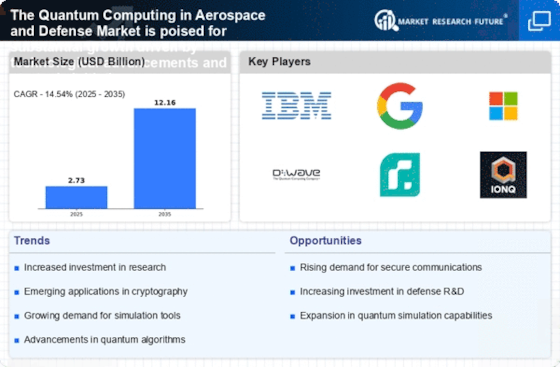Top Industry Leaders in the Quantum Computing Aerospace Defense Market

Key Companies in the Quantum Computing in Aerospace & Defense market include
D-Wave Systems Inc. (US)
Qxbranch LLC (US)
IBM Corporation (US)
Cambridge Quantum Computing Ltd (UK)
1qb Information Technologies Inc. (Canada)
QC Ware Corp. (US)
Magiq Technologies Inc. (US)
Station Q-Microsoft Corporation (US)
Rigetti Computing (US).
Strategies Adopted
Industry news within the Quantum Computing in Aerospace & Defense market reflects ongoing trends, regulatory changes, and technological advancements driving the sector forward. News related to successful quantum computing demonstrations, government contracts for quantum research, and advancements in quantum hardware and software showcase efforts to accelerate the adoption of quantum computing in defense applications. Moreover, developments in quantum cryptography, quantum communication, and quantum sensing are frequently covered in industry news, highlighting the potential of quantum technologies to revolutionize defense capabilities and enhance national security.
Current investment trends in the Quantum Computing in Aerospace & Defense industry underscore a focus on research and development, technology partnerships, and government collaborations. Key players are directing investments towards developing error-corrected quantum processors, quantum-resistant cryptography, and quantum-safe communication protocols to address emerging threats in cyberspace and beyond. Investments in quantum software development, quantum algorithm optimization, and quantum hardware integration with classical computing systems are prevalent, reflecting the industry's commitment to advancing quantum computing capabilities for defense applications. Additionally, strategic investments in quantum workforce development, education, and training aim to build internal expertise and capacity to harness the full potential of quantum technologies in aerospace and defense.
Emerging Companies
As quantum computing continues to gain traction in aerospace and defense applications, new and emerging companies are entering the market, contributing to innovation and product development. Start-ups and specialized firms such as IonQ Inc., Xanadu Quantum Technologies Inc., and Quantum Circuits Inc. are gaining recognition by providing novel quantum computing solutions tailored to specific defense requirements, such as cryptography, optimization, and simulation. These companies leverage expertise in quantum physics, quantum information theory, and hardware engineering to develop scalable, error-corrected quantum processors and quantum algorithms optimized for defense applications. The industry is witnessing a trend towards the development of hybrid quantum-classical computing solutions, enabling seamless integration with existing aerospace and defense systems while unlocking new capabilities in data analysis, pattern recognition, and decision support.
The overall competitive scenario in the Quantum Computing in Aerospace & Defense market is characterized by established technology providers and dynamic newcomers, each navigating the industry with distinct strategies. Market share analysis considers factors such as quantum processing power, qubit reliability, scalability, and security features. The industry's responsiveness to technological advancements, regulatory requirements, and defense priorities further shapes competitiveness. As quantum computing continues to mature and gain momentum in aerospace and defense applications, companies in this sector are striving to balance innovation, reliability, and security to maintain a competitive edge in a dynamic and highly specialized market landscape.
Recent News
Airbus (France):
Developing Quantum Secure Communication Networks: Airbus aims to leverage quantum cryptography for secure communication in satellites and defense systems, protecting against potential decryption by quantum computers.
Partnership with D-Wave Systems: Airbus collaborates with the quantum computing leader D-Wave to explore applications in aircraft design, maintenance, and flight optimization.
Lockheed Martin (USA):
Focus on Quantum Radar and Sensor Technologies: Lockheed Martin actively researches and develops quantum radar and sensor systems for enhanced detection and tracking capabilities, potentially enabling early warning of missile threats.
Investment in Quantum Computing Startups: Lockheed Martin invests in promising quantum computing startups to gain early access to cutting-edge technologies and talent.
Raytheon Technologies (USA):
Focus on Quantum Simulation and Modeling: Raytheon explores using quantum computers to simulate complex physical phenomena, optimizing missile design and enhancing weapon effectiveness.
Developing Quantum-Resistant Encryption Solutions: Raytheon prioritizes research in quantum-resistant encryption algorithms to safeguard defense communications from future threats.
BAE Systems (UK):
Emphasis on Quantum Logistics and Supply Chain Management: BAE Systems investigates employing quantum algorithms for advanced logistics and supply chain management within military operations, improving efficiency and resilience.
Collaboration with University of York: BAE Systems partners with the University of York to research quantum algorithms for materials science, potentially leading to revolutionary advancements in aircraft design and production.
Google Quantum AI (USA):
Focus on Open-Source Quantum Software Development: Google Quantum AI contributes to open-source quantum software development, making tools and algorithms accessible for broader research and applications in A&D.
Collaboration with NASA: Google Quantum AI partners with NASA to explore applications of quantum computing in space exploration and mission planning.
Emerging Trends in Quantum Computing in A&D:
Focus on quantum-resistant cryptography and secure communication networks.
Advancement in quantum radar and sensor technologies for enhanced detection and tracking.
Exploration of quantum simulation for efficient design and optimization of aerospace systems.
Development of quantum algorithms for logistics, supply chain management, and mission planning.
Increased collaborations between A&D companies, quantum computing startups, and academic institutions.











